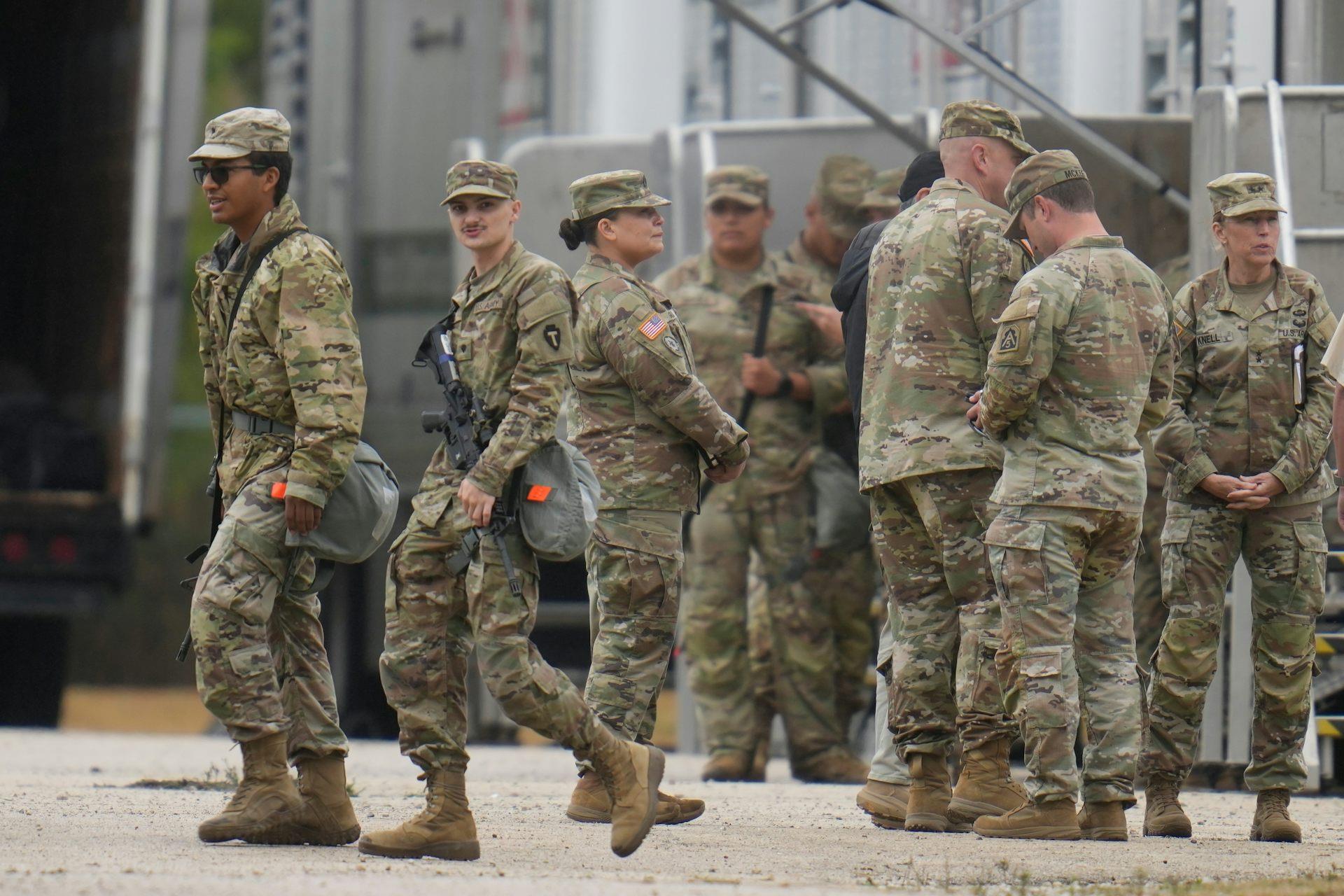
Explainer: What Powers Does Trump Actually Have To Deploy The Military To US Cities?
If it does, the nine justices will be faced with sorting out a dog's breakfast of constitutional and statutory laws full of contradictions and ambiguities.
Given the propensity of the current Supreme Court to support and even extend the scope of presidential authority, it could very well rule in Trump's favour. And this would have far-reaching implications for civil liberties and democracy in the United States.
How did we get to this point, and what does the law actually say about using the National Guard in US cities?

Personnel with the Texas National Guard are seen at the US Army Reserve Centre in suburban Chicago this week. Erin Hooley/AP What is Trump attempting to do?
The National Guard is made up of part-time reservists assigned to units in each state. These soldiers are typically called into service by the governors of the states where they serve to respond to disasters or large protests.
In certain circumstances, presidents can also“federalise” National Guard troops, though it rarely happens against a governor's wishes. Before this year, the last time this happened was in Selma, Alabama, in 1965, to protect civil rights protesters.
In recent months, Trump has attempted to“federalise” the National Guard units belonging to several states and dispatch them to cities (Los Angeles, Memphis, Washington DC, Portland and Chicago) that he claims are out of control.
The troop deployments have been opposed by the Democratic governors in some of these states, then blocked or restricted by temporary restraining orders issued by federal district court judges. (The order in California was subsequently stayed by the US Court of Appeals, pending a further appeal).
There are several issues being contested:
-
the conditions under which the National Guard can be mobilised by the federal government
the degree of collaboration between federal and state governments in issuing orders to the National Guard, and
the prohibition on the military being used for domestic law enforcement purposes.
Trump's moves are testing the uncertain boundaries of all these constraints on executive power. But, more significantly, he is also challenging the long-standing American tradition of keeping the military out of domestic politics.
What are the legal issues at play?The constitutional authority to deploy the National Guard is actually assigned to Congress, not the president. Article 1, Section 8 of the US Constitution gives Congress the power to“provide for calling forth the militia to execute the laws of the Union, suppress insurrections and repel invasions”. Militias have been interpreted to include the National Guard.
However, the Constitution also charges the president with two very significant duties. The first is to“preserve, protect and defend the Constitution of the United States”; the second is to“take care that the laws be faithfully executed”. These two duties can amount to a significant grant of power in times of crisis.
The Trump administration will almost certainly argue he is deploying the National Guard in these US cities to carry out these duties.
There's a bigger issue for Trump, though. Another law, the Posse Comitatus Act of 1878 , makes it illegal for federal troops to engage in civilian law enforcement unless expressly authorised by the Constitution or the law.
Trump is currently acting without this explicit legal authorisation. However, as the Brennan Center for Justice has recently pointed out , there are 26 different laws that allow for the military to execute the law in specific situations. These exceptions undermine the purpose of the Posse Comitatus Act, making the case for urgent reform of the law.
What about the Insurrection Act?One of these exceptions is the Insurrection Act of 1807 , which gives the president the power to use the military or federalise National Guard troops to put down domestic uprisings. Since the civil rights movement in the 1960s, the act has seldom been used.
Trump said this week he would consider invoking the act to“get around” any court decisions blocking his move to deploy National Guard troops in US cities.
He also claimed the demonstrations against the US Immigration and Customs Enforcement (ICE) building in Portland amounted to a“criminal insurrection”.
Trump then ramped up the rhetoric and the hyperbole even further by calling for the jailing of Illinois Governor JB Pritzker and Chicago Mayor Brandon Johnson for failing to protect ICE agents in that city.
Police and federal officers throw gas canisters to disperse protesters near a US Immigration and Customs Enforcement facility in Portland, Oregon, this week. Ethan Swope/AP
The demonstrations against Trump's immigration policies in Los Angeles, Portland, and Chicago are nowhere near meeting the definition of insurrection.
But, as the president told the meeting of military generals in Virginia last week, he is keen to push the bounds on using the military in domestic affairs. Or, as he put it, to use these cities as“training grounds” for the armed forces.
If the Supreme Court rules in Trump's favour on this issue, it would be tantamount to saying the president is the only arbiter on whether a political protest amounts to an insurrection and when it's necessary to use the military to quell it.
It would also expand the scope for Trump to use the military in other areas of domestic politics.
The president has already deployed the military for border protection, so patrolling universities or even the lines outside polling stations on election day could be next.

Legal Disclaimer:
MENAFN provides the
information “as is” without warranty of any kind. We do not accept
any responsibility or liability for the accuracy, content, images,
videos, licenses, completeness, legality, or reliability of the information
contained in this article. If you have any complaints or copyright
issues related to this article, kindly contact the provider above.


















Comments
No comment